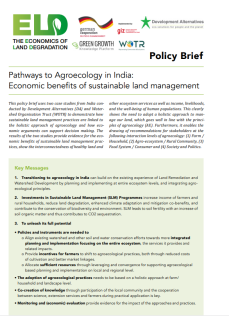
This policy brief uses two case studies from India conducted by Development Alternatives (DA) and Watershed Organisation Trust (WOTR) to demonstrate how sustainable land management practices are linked to the holistic approach of agroecology and how economic arguments can support decision making.
The results of the two studies provide evidence for the economic benefits of sustainable land management practices, show the interconnectedness of healthy land and other ecosystem services as well as income, livelihoods, and the well-being of human populations. This clearly shows the need to adopt a holistic approach to manage our land, which goes well in line with the principles of agroecology (AE). Furthermore, it enables the drawing of recommendations for stakeholders at the following interaction levels of agroecology: (1) Farm / Household, (2) Agro-ecosystem / Rural Community, (3) Food System / Consumer and (4) Society and Politics.
